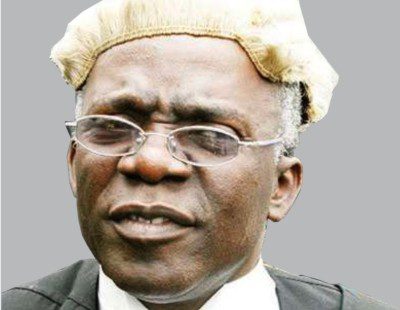Nigeria
Nigeria Has Experience With Cases Like The Present Presidential Petitions That Didn’t Favor The Applicants -Falana

Femi Falana (SAN), a human rights attorney, stated that Nigeria has bemoaned having the “highest number of pre-election cases in the world and the highest number of election petitions.”
The Senior Advocate of Nigeria added that the issue should be a matter of concern to “forces of democracy”.
When discussing the 2023 general elections, including Bola Tinubu’s victory in the presidential race for the All Progressives Congress, Falana made this disclosure.
The Presidential Election applications Tribunal in Abuja received four applications from contenders for the presidency asking for the proclamation of Tinubu as the winner of the election on February 25 to be overturned.
Falana asserted that similar lawsuits in Nigeria had in the past resulted in defeat for the petitioners.
Atiku Abubakar of the PDP, Peter Obi of the Labour Party, Solomon Okangbuan of the Action Alliance, and Chichi Ojei of the Allied People’s Movement are the petitioners who are asking for Tinubu’s election as “President-elect” to be revoked.
With 6,984,520 votes, Atiku finished in second place, followed by Obi with 6,101,533 votes.
INEC, Tinubu, Shettima Kashim, his running mate, and the APC were respondents to the petition filed by Obi and LP with the file number CA/PEPC/03/2023.
Additionally, Obi said in the petition that Tinubu “was not duly elected by majority of the lawful votes cast at the time of the election.”
In the declaration of results based on the uploaded results, Obi asserted that there was rigging in 11 states and promised to show this.
Falana responded by saying that a lot will depend on the petitioners’ evidence.
According to our past of election petitions, I can tell you that for me, it is highly upsetting, and I have constantly stressed this point. However, I am not in the least bit pessimistic. The judges cannot be allowed to continue to be involved in the selection of our representatives. That matter needs to be resolved.
“We believed that after sufficiently reforming the electoral process, the judiciary should now be removed from the electoral process. The news that Nigerians now claim the election has been shifted to the judiciary disturbs me as a lawyer. That’s not exactly flattering.
The world’s biggest number of pre-election litigation and election petitions are in Nigeria, however, as I have already stated elsewhere. All sincere proponents of democracy ought to be concerned about it.
“We have had cases of this nature before,” Falana continued, “but yes! (it hasn’t been in the applicant’s favor) but again, I go back to the 2007 presidential election.”
He claimed that the 2007 decision might have gone either way since there were four Supreme Court justices who were split against three other judges.
So, as I already stated, it depends on the evidence presented. In a few African nations, the court has declared the results of the presidential elections invalid. In Nigeria, some state-level election challenges that sought to oust the governor in office were successful. Therefore, there shouldn’t be any reason for concern, he stated.
Mr. Falana criticized the governments that replaced the late President Umaru Yar’Adua for not implementing the recommendations made by the Justice Uwais Electoral Reform Panel regarding the widespread irregularities that characterized electoral petitions.
“I am not a stakeholder, but the Yar’Adua government established the Justice Uwais Electoral Reform Panel to look into this issue because the election’s victor did publicly state that the election that produced me was severely flawed, so I am going to put an end to this ugly development,” he continued.
Furthermore, the panel made significant recommendations regarding the INEC’s complete independence, the resolution of the election petition prior to the installation of a new administration, and the creation of an electoral offences commission to handle electoral offenses and misdemeanors so that the Attorney General won’t dismiss those cases by filing a nolle prosequi application.
But what has actually happened is that successive governments have simply disregarded such key advice. We are where we are for this reason.
